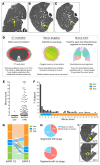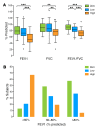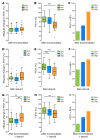Mucus plugs in patients with asthma linked to eosinophilia and airflow obstruction
- PMID: 29400693
- PMCID: PMC5824874
- DOI: 10.1172/JCI95693
Mucus plugs in patients with asthma linked to eosinophilia and airflow obstruction
Abstract
Background: The link between mucus plugs and airflow obstruction has not been established in chronic severe asthma, and the role of eosinophils and their products in mucus plug formation is unknown.
Methods: In clinical studies, we developed and applied a bronchopulmonary segment-based scoring system to quantify mucus plugs on multidetector computed tomography (MDCT) lung scans from 146 subjects with asthma and 22 controls, and analyzed relationships among mucus plug scores, forced expiratory volume in 1 second (FEV1), and airway eosinophils. Additionally, we used airway mucus gel models to explore whether oxidants generated by eosinophil peroxidase (EPO) oxidize cysteine thiol groups to promote mucus plug formation.
Results: Mucus plugs occurred in at least 1 of 20 lung segments in 58% of subjects with asthma and in only 4.5% of controls, and the plugs in subjects with asthma persisted in the same segment for years. A high mucus score (plugs in ≥ 4 segments) occurred in 67% of subjects with asthma with FEV1 of less than 60% of predicted volume, 19% with FEV1 of 60%-80%, and 6% with FEV1 greater than 80% (P < 0.001) and was associated with marked increases in sputum eosinophils and EPO. EPO catalyzed oxidation of thiocyanate and bromide by H2O2 to generate oxidants that crosslink cysteine thiol groups and stiffen thiolated hydrogels.
Conclusion: Mucus plugs are a plausible mechanism of chronic airflow obstruction in severe asthma, and EPO-generated oxidants may mediate mucus plug formation. We propose an approach for quantifying airway mucus plugging using MDCT lung scans and suggest that treating mucus plugs may improve airflow in chronic severe asthma.
Trial registration: Clinicaltrials.gov NCT01718197, NCT01606826, NCT01750411, NCT01761058, NCT01761630, NCT01759186, NCT01716494, and NCT01760915.
Funding: NIH grants P01 HL107201, R01 HL080414, U10 HL109146, U10 HL109164, U10 HL109172, U10 HL109086, U10 HL109250, U10 HL109168, U10 HL109257, U10 HL109152, and P01 HL107202 and National Center for Advancing Translational Sciences grants UL1TR0000427, UL1TR000448, and KL2TR000428.
Keywords: Asthma; Cytokines; Pulmonology; Th2 response.
Conflict of interest statement
Figures







Comment in
-
All plugged up - noninvasive mucus score to assess airway dysfunction in asthma.J Clin Invest. 2018 Mar 1;128(3):906-909. doi: 10.1172/JCI99726. Epub 2018 Feb 5. J Clin Invest. 2018. PMID: 29400694 Free PMC article.
References
-
- Huber HC, Koessler KK. The pathology of bronchial asthma. Arch Intern Med. 1922;30(6):689–760. doi: 10.1001/archinte.1922.00110120002001. - DOI
Publication types
MeSH terms
Substances
Associated data
Grants and funding
- U10 HL109257/HL/NHLBI NIH HHS/United States
- UL1 TR000427/TR/NCATS NIH HHS/United States
- P30 ES005605/ES/NIEHS NIH HHS/United States
- K23 HL138303/HL/NHLBI NIH HHS/United States
- P01 HL107202/HL/NHLBI NIH HHS/United States
- P01 HL128191/HL/NHLBI NIH HHS/United States
- K24 HL137013/HL/NHLBI NIH HHS/United States
- U10 HL109250/HL/NHLBI NIH HHS/United States
- KL2 TR000428/TR/NCATS NIH HHS/United States
- U10 HL109168/HL/NHLBI NIH HHS/United States
- R01 HL080414/HL/NHLBI NIH HHS/United States
- U10 HL109172/HL/NHLBI NIH HHS/United States
- KL2 TR002374/TR/NCATS NIH HHS/United States
- U10 HL064313/HL/NHLBI NIH HHS/United States
- R01 HL122531/HL/NHLBI NIH HHS/United States
- U19 AI077439/AI/NIAID NIH HHS/United States
- U10 HL109164/HL/NHLBI NIH HHS/United States
- UL1 TR000448/TR/NCATS NIH HHS/United States
- UL1 TR002373/TR/NCATS NIH HHS/United States
- P30 DK054759/DK/NIDDK NIH HHS/United States
- U10 HL109086/HL/NHLBI NIH HHS/United States
- UL1 TR002345/TR/NCATS NIH HHS/United States
- U10 HL109152/HL/NHLBI NIH HHS/United States
- U10 HL109146/HL/NHLBI NIH HHS/United States
LinkOut - more resources
Full Text Sources
Other Literature Sources
Medical
Research Materials

